
Wie Emotionen Entscheidungen beeinflussen – @freitagmarkus.bsky.social
Wenn Menschen sich emotional betroffen fühlen, beeinflusst dies ihre Überzeugungen und ihr Verhalten. Dies zeigt Markus Freitag in seiner Kolumne:
www.defacto.expert/2026/01/22/w...
05.02.2026 10:08 —
👍 0
🔁 1
💬 0
📌 0
👉Our findings suggest that the perception of scientific integrity is severely threatened during crisis – right when expertise and guidance may be needed the most.👇
www.tandfonline.com/doi/full/10....
21.01.2026 06:17 —
👍 7
🔁 2
💬 0
📌 0
When crises evoke anger, people are more likely to believe conspiracy theories about scientists 😶🌫️
First article out, with @danielauer.bsky.social & @freitagmarkus.bsky.social 🎉
Under Attack: How Social Threats Push Negative Beliefs about Scientists in Germany🔗 www.tandfonline.com/doi/full/10....
15.01.2026 13:12 —
👍 3
🔁 1
💬 0
📌 0

✋In der Politik sind Emotionen Fakten. Mehr dazu hier👇
www.tagesanzeiger.ch/politik-und-...
08.01.2026 06:10 —
👍 7
🔁 1
💬 1
📌 1

✋Heute einmal Lust auf positive Schlagzeilen?
www.tagesanzeiger.ch/schweizer-de...
03.12.2025 05:56 —
👍 3
🔁 0
💬 0
📌 0

✋Ostrazismus. Eine Gefahr für die Demokratie?
www.tagesanzeiger.ch/ostrazismus-...
06.11.2025 06:21 —
👍 4
🔁 0
💬 0
📌 0

✋Heute in der Vorlesung "Demokratie und Gesellschaft II": #Vertrauen. Ein Klassiker. Hier ein Text dazu:👇
www.tagesanzeiger.ch/vertrauen-wi...
15.10.2025 10:55 —
👍 4
🔁 0
💬 0
📌 0

👉Zur aktuellen Diskussion über das nachlassende Vertrauen in den Schweizer Bundesrat hier noch eine politikwissenschaftliche Einschätzung👇
www.tagesanzeiger.ch/nichts-da-da...
02.10.2025 11:21 —
👍 3
🔁 0
💬 0
📌 0

✋Es gibt wohl kaum ein soziales Gebilde, das derart besungen, glorifiziert, belächelt oder verdammt wird wie der #Verein.
www.tagesanzeiger.ch/vereine-schw...
02.10.2025 05:35 —
👍 9
🔁 3
💬 0
📌 1
 20.09.2025 10:02 —
👍 0
🔁 0
💬 0
📌 0
20.09.2025 10:02 —
👍 0
🔁 0
💬 0
📌 0

✋Nachbarschaft als #Sozialkapital.
www.tagesanzeiger.ch/schweizer-he...
05.09.2025 07:35 —
👍 3
🔁 0
💬 0
📌 0

Sage Journals: Discover world-class research
Subscription and open access journals from Sage, the world's leading independent academic publisher.
New study out today—“Is the Urban-Rural Divide Affectively Polarised?“ finds a substantial political cleavage between urban and rural populations in multiple European countries. Place-based affective polarization is associated with voting along liberal vs nationalist divide #PoliticalScience
30.08.2025 14:37 —
👍 34
🔁 16
💬 0
📌 1
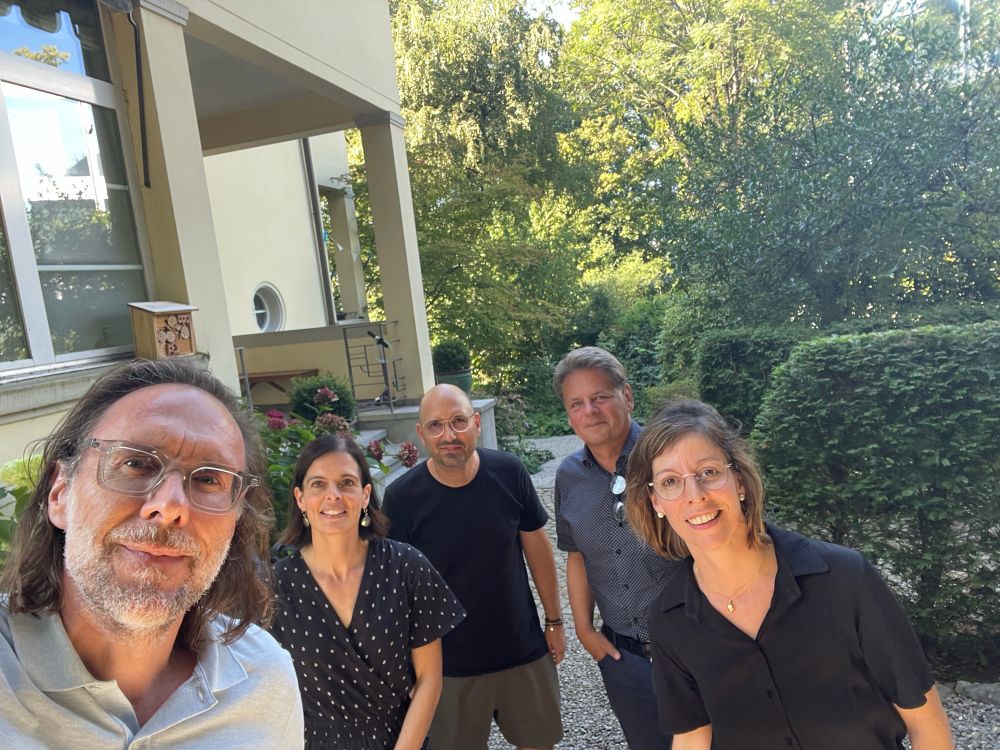
#retraite2025
@ipwunibern.bsky.social
bestes team der welt.
18.08.2025 18:41 —
👍 13
🔁 2
💬 0
📌 0

‼️Our new paper with magnificent colleagues @alinazumbrunn.bsky.social @antonialang.bsky.social on how place experience shapes place-based (rural/urban) identity is now out at the Journal of Rural Studies!
👇 (1/5)
14.08.2025 13:49 —
👍 24
🔁 7
💬 1
📌 0

✋Kennen Sie den Sinn des Lebens? Ein paar Worte und Zahlen dazu👇
www.tagesanzeiger.ch/identitaetss...
09.08.2025 05:23 —
👍 2
🔁 0
💬 0
📌 0

🇨🇭Nationalfeiertag. Wie verbunden sind Sie mit der Schweiz?
www.tagesanzeiger.ch/schweizer-he...
01.08.2025 06:13 —
👍 0
🔁 0
💬 0
📌 0
📢 Out now! The Handbook of Affective Polarization is officially published 🎉
📖 Open Access & packed with 30 great chapters thanks to amazing authors. Huge thanks to everyone, and in particular to @marianotorcal.bsky.social for the great (and fun) collaboration! 💙
Link below for the e-book 👇
24.07.2025 14:04 —
👍 42
🔁 19
💬 0
📌 0
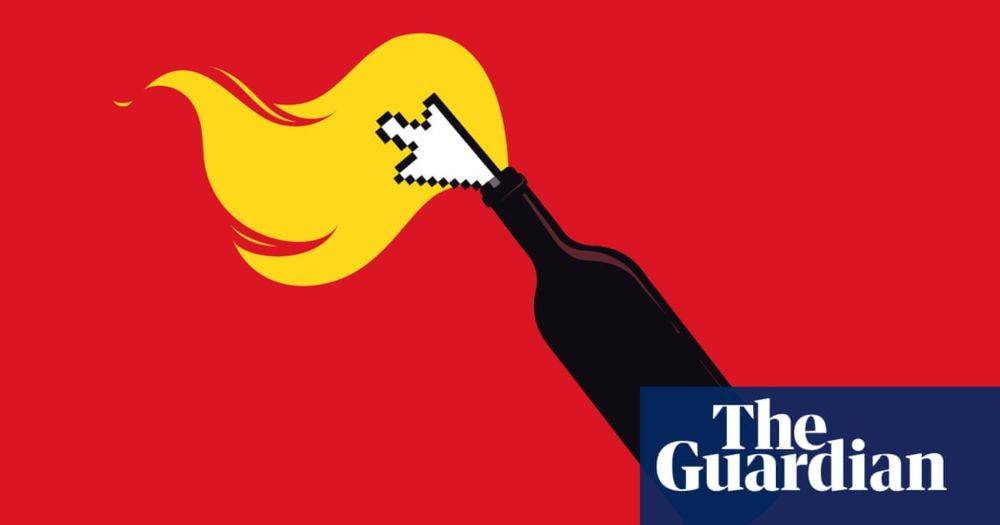
Are a few people ruining the internet for the rest of us?
Why does the online world seem so toxic compared with normal life? Our research shows that a small number of divisive accounts could be responsible – and offers a way out
Only a small % of people engage in toxic activity online, but they’re responsible for a disproportionate share of hostile or misleading content on nearly every platform
Because super-users are so active, they dominate our collective impression of the internet www.theguardian.com/books/2025/j...
13.07.2025 15:32 —
👍 551
🔁 213
💬 21
📌 32

Wohlfühloase Schweiz. Ein paar Worte und Zahlen dazu👇
www.tagesanzeiger.ch/gesundheit-l...
04.07.2025 06:41 —
👍 1
🔁 1
💬 0
📌 0

Durkheim und die Schweiz. Ein paar Worte und Zahlen dazu👇
www.tagesanzeiger.ch/unsicherheit...
11.06.2025 07:30 —
👍 2
🔁 1
💬 0
📌 0
 08.06.2025 19:48 —
👍 1
🔁 0
💬 0
📌 0
08.06.2025 19:48 —
👍 1
🔁 0
💬 0
📌 0
 08.06.2025 19:47 —
👍 0
🔁 0
💬 0
📌 0
08.06.2025 19:47 —
👍 0
🔁 0
💬 0
📌 0


Im Rahmen des Fokus' "Forschung aus Betroffenheit" des Forschungsmagazins #Horizonte durfte ich mit Katharina Rilling über meine rezidivierende #Depression & unsere Forschung zu politischen Konsequenzen psychischer Belastungen sprechen.
www.horizonte-magazin.ch/2025/06/05/m...
Fotos: Anoush Abrar
05.06.2025 08:54 —
👍 9
🔁 3
💬 0
📌 3
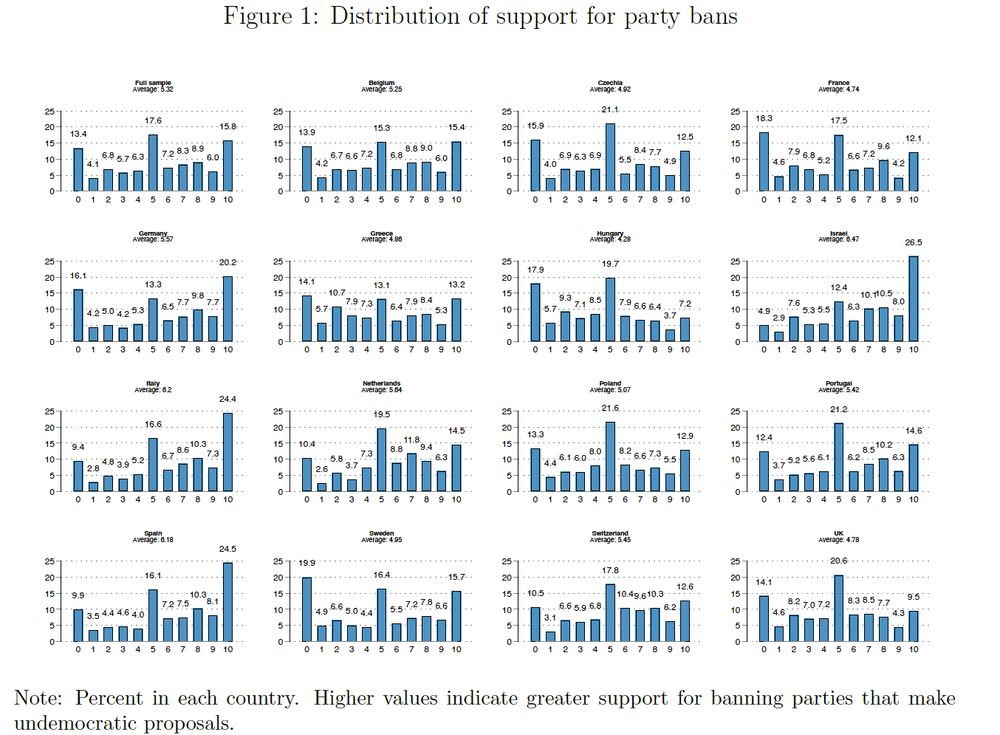
Should democracies ban parties that threaten democracy?
In the DEMOTRADEOFF project survey we asked people in 15 countries about this.
A short 🧵 with some results
Citizens are deeply divided about this issue
Support for bans is highest in 🇮🇱 🇮🇹 🇪🇸 🇳🇱 🇵🇹 🇨🇭 🇩🇪
www.dw.com/en/germany-i...
02.05.2025 10:56 —
👍 75
🔁 28
💬 3
📌 4
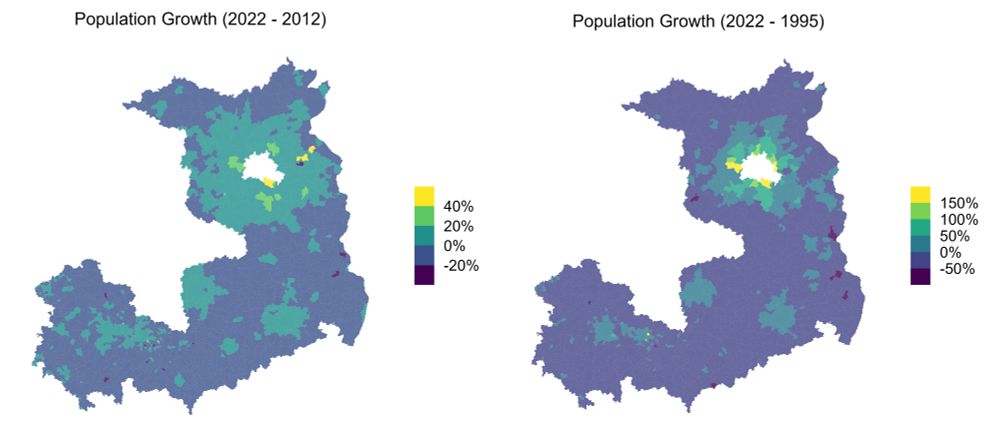
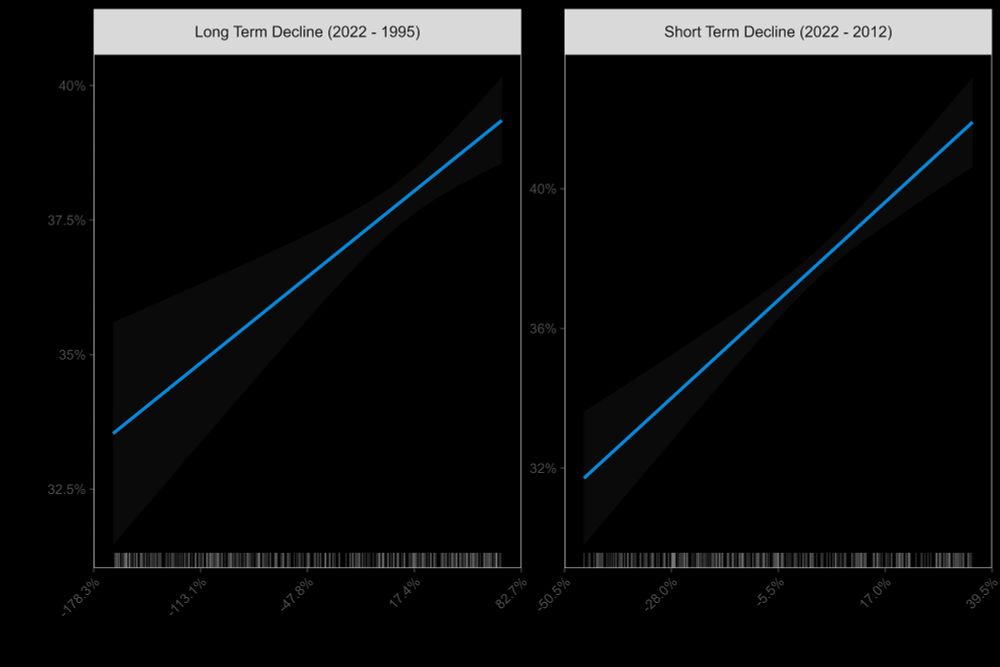
What are the political consequences of long-term population loss? In a new paper for German Politics @benjaminhoehne.bsky.social, Hendrik Träger and I find that East German places more affected by depopulation provided stronger support for the AfD in recent state elections.🧵👇
shorturl.at/cujwa
22.04.2025 07:24 —
👍 252
🔁 95
💬 13
📌 9

Das Bild zeigt das Cover des Buchs

Das Bild zeigt die Rückseite des Covers:
Hat sich Deutschland politisch auseinandergelebt? Grenzen sich Anhänger der unterschiedlichen politischen Gruppen auch räumlich vermehrt voneinander ab? Finden wir politisch typische und untypische Orte eher in den Metropolen, in den mittleren und kleineren Städten oder auf dem Land? In Ost- oder in Westdeutschland? Mit einem einzigartigen Datenschatz zum Wahlverhalten in allen 94.000 Wahlbezirken Deutschlands geht Ansgar Hudde diesen Fragen nach und entdeckt: Die Mehrheit der Deutschen lebt nicht in politischen Blasen, sondern in Nachbarschaften, deren Wahlverhalten grob dem Bundestrend entspricht.
Das Buch verknüpft die Analyse von Wahlergebnissen mit sozialstrukturellen Daten und Gesprächen vor Ort und zeichnet dadurch kenntnisreich Lokalporträts ausgewählter deutscher Orte. Hudde identifiziert vier Wahlmuster in Deutschlands Nachbarschaften: das politische Typischdeutschland, vor allem in westdeutschen Klein- und Mittelstädten, das Konservativ-Wahlmuster im ländlichen Bayern, das AfD-trifft-Linke-Wahlmuster in Ostdeutschland jenseits der Großstadtzentren und das Grün-Links-Wahlmuster in den zentrumsnahen Vierteln von Metropolen und Universitätsstädten. Wer diese Wahlmuster kennt und ein Bild von den charakteristischen Orten und Nachbarschaften vor Augen hat, kennt nicht nur Deutschlands politische Landkarte, sondern gewinnt auch ein tieferes Verständnis der Bundesrepublik insgesamt. Eine aufschlussreiche Analyse, die auch die Bundestagswahl 2025 einschließt!
»Ansgar Hudde entwickelt in seinem Buch eine Kartografie des Wahlverhaltens, die eindrücklich zeigt: Orte und Regionen machen einen Unterschied. Deutschland tickt sehr anders, je nachdem, wo man sich befindet. Eine willkommene Landkarte zur Navigation durch die politische Landschaft.« Steffen Mau
Ab in den Druck!🎉
Mein Buch „Wo wir wie wählen: Politische Muster in Deutschlands Nachbarschaften“ ab 18.06. bei Campus
Eine politische Landkarte🇩🇪 basierend auf Wahldaten, Sozialstruktur & Eindrücken vor Ort
Jetzt vorbestellen—in eurer Lieblingsbuchhandlung oder hier www.campus.de/buecher-camp...
15.04.2025 07:37 —
👍 116
🔁 33
💬 7
📌 2

Freiheit oder Sicherheit? Wie die Impffrage die Schweiz wieder polarisiert
Die Masern, längst vergessen und scheinbar ausgerottet, sind zurück. Und mit ihnen die Impffrage.
✋ Was halten die Menschen in der #Schweiz von #Impfungen gegen Infektionskrankheiten? Zieht sich ein #Impfgraben durchs Land?
Meine Gedanken dazu im @tagesanzeiger.bsky.social 👇
www.tagesanzeiger.ch/masern-und-c...
oder via @unibe.ch 👇
www.uniaktuell.unibe.ch/2025/politko...
03.04.2025 04:39 —
👍 2
🔁 1
💬 0
📌 0

Support for populist attitudes is generally thought to increase as voters feel threatened by and angry at the status quo. However, @danielauer.bsky.social and @freitagmarkus.bsky.social argue that this threat induced anger only becomes relevant once a threat directly affects citizen’s norms.
25.03.2025 16:02 —
👍 4
🔁 3
💬 1
📌 0







 20.09.2025 10:02 —
👍 0
🔁 0
💬 0
📌 0
20.09.2025 10:02 —
👍 0
🔁 0
💬 0
📌 0









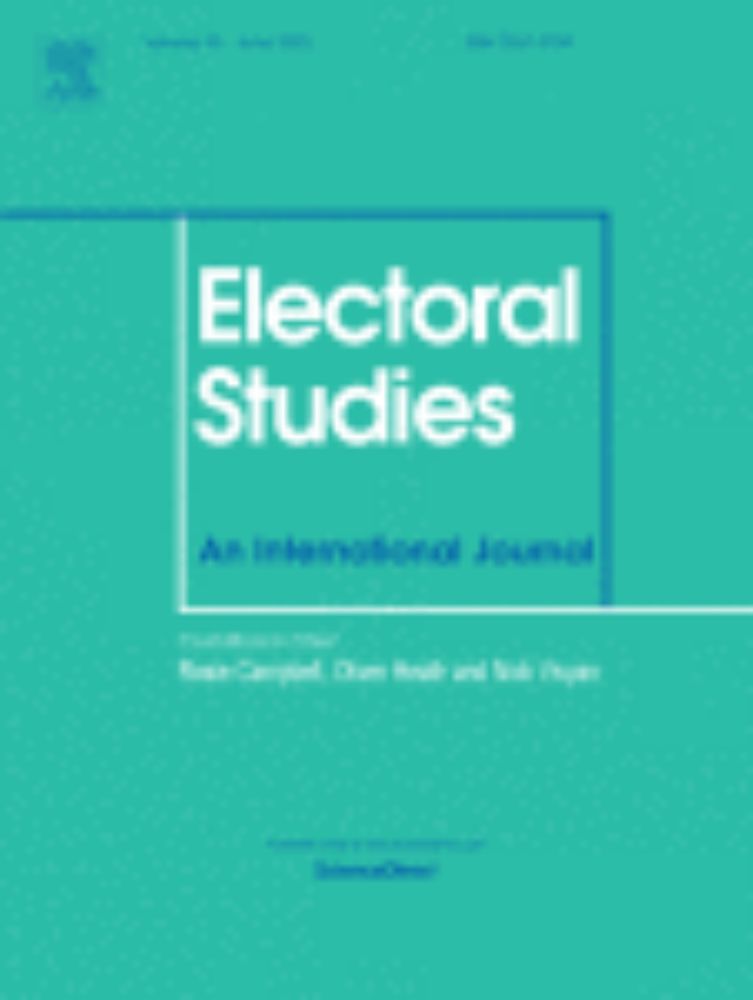

 08.06.2025 19:48 —
👍 1
🔁 0
💬 0
📌 0
08.06.2025 19:48 —
👍 1
🔁 0
💬 0
📌 0
 08.06.2025 19:47 —
👍 0
🔁 0
💬 0
📌 0
08.06.2025 19:47 —
👍 0
🔁 0
💬 0
📌 0








